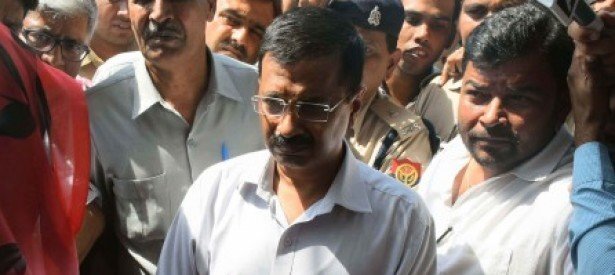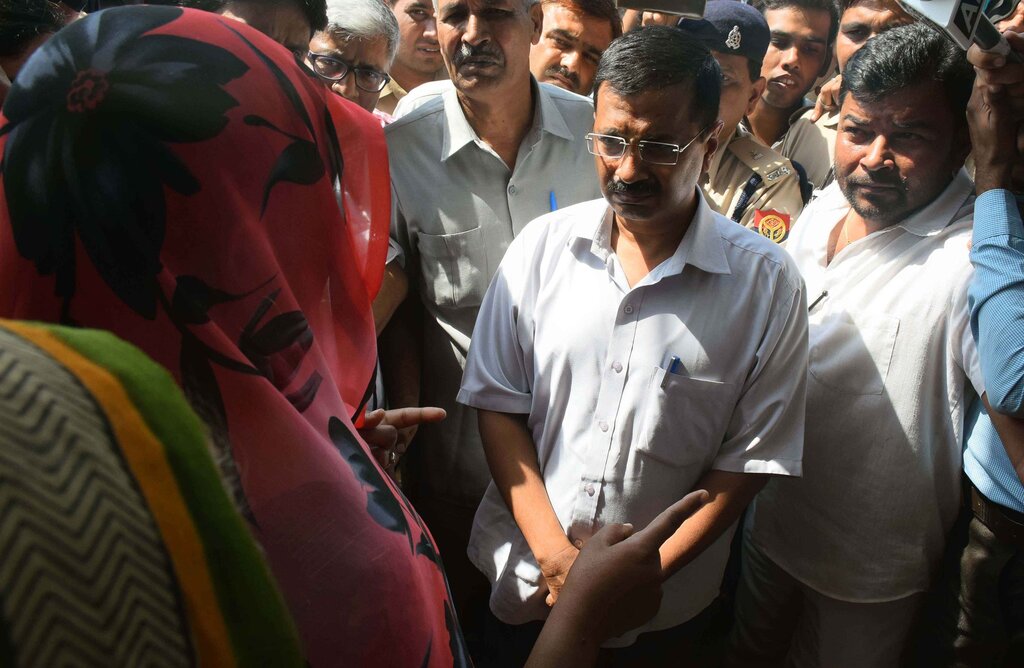മുഖ്യമന്ത്രി അരവിന്ദ് കെജ് രിവാളിനെ നാട്ടുകാര് തടഞ്ഞു

ബസെറ: പശു ഇറച്ചി കഴിച്ചെന്നാരോപിച്ച് കൊലപ്പെടുത്തിയ അഖ്ലാക്കിന്െറ വീട് സന്ദര്ശിക്കാനത്തെിയ ഡല്ഹി മുഖ്യമന്ത്രി അരവിന്ദ് കെജ് രിവാളിനെ നാട്ടുകാര് തടഞ്ഞു.
ദാദ്രിയിലെ ബസെറയില് വെച്ചാണ് കെജ്രിവാളിനെ നാട്ടുകാര് തടഞ്ഞത്. സ്ത്രീകളടക്കമുള്ള ജനക്കൂട്ടമാണ് പ്രതിഷേധവുമായി രംഗത്തത്തെിയത്. രാവിലെ മാധ്യമപ്രവര്ത്തകരെയും ഇവര് തടഞ്ഞിരുന്നു. ഗ്രാമത്തിലേക്ക് ദിവസവും സന്ദര്ശകര് വരുന്നത് തങ്ങളുടെ ജീവിതത്തെ ബാധിക്കുന്നുവെന്നും ഇനിയും മാധ്യമപ്രവര്ത്തകരും രാഷ്ട്രീയക്കാരും ഗ്രാമത്തിലത്തൊന് അനുവദിക്കില്ളെന്നും പറഞ്ഞാണ് ജനക്കൂട്ടം രംഗത്തത്തെിയത്.
Kejriwal meets Akhlaq's family, calls lynching 'unfortunate'
Greater Noida, Oct 3 (IANS) Delhi Chief Minister Arvind Kejriwal on Saturday met the bereaved family of Mohammad Akhlaq who was lynched here following rumours that he ate beef, and described as "unfortunate" the brutal murder. Police, meanwhile, arrested two more suspects, taking the total arrests to eight.
The Aam Aadmi Party leader was allowed to meet the 50-year-old man's widow and mother after he waited patiently for about four hours at a guest house after being initially barred by police from reaching Bisara village.
Kejriwal's motorcade was halted after many Hindu women took to the streets protesting against the alleged bias of the media and officialdom following the September 28 night killing. Some of the demonstrators pelted stones.
After meeting the family of the victim, one of whose sons is in the Indian Air Force (IAF), Kejriwal said: "This incident is unfortunate and completely against humanity."
Akhlaq was allegedly dragged out of his house and lynched after rumours spread that he slaughtered a cow, an animal venerated by Hindus. The family has denied the charge, saying they only ate mutton.
Targeting other political parties, Kejriwal said: "Neither Hindus nor Muslims benefited (from the killing). Only political parties and their leaders took advantage of the incident.
"One party wants to make Hindus its vote bank, while another is eyeing Muslim votes by poisoning relations between Hindus and Muslims," he told reporters in the village, a clear reference to the Bharatiya Janata Party and Uttar Pradesh's ruling Samajwadi Party.
Police, meanwhile, arrested two more people, including the son of a local BJP leader, taking the total number of arrests in the case to eight. Two other accused are on the run.
Earlier in the day, over 500 Hindu women blocked roads leading to the village. They took out a procession, claiming journalists and politicians were biased in favour of the victim's community.
As a result, police were looking for young Hindu men with a view to arrest them, they complained.
Many said they lived with Muslims and helped them build their shelters and mosque.
Some of the villagers attacked the vehicles of a few journalists.
Kejriwal spent about half an hour in the village and listened to the woes of the Hindu families as well.
He wanted to know why he and his colleagues were stopped by police and the administration when union Culture Minister Mahesh Sharma as well as Majlis-e-Ittehadul Muslimeen (MIM) leader Asaduddin Owaisi were allowed to enter the village on Friday.
"Why me? I am most peace loving," Kejriwal tweeted.
"I am being accused of doing politics. Yes, I am doing politics. But I am doing politics of unity and love, they are doing politics of hatred.
"We firmly believe that Hindus and Muslims have to stay united and not become vote banks. They want to divide people," he added, not elaborating the "they".
Sharma, the BJP Lok Sabha member from Gautam Buddha Nagar under which the area falls, and Hyderabad MP Owaisi met the dead man's family on Friday.
Also on Saturday, Air Chief Marshal Arup Raha termed as an "unfortunate incident" the lynching of the father of an IAF personnel, and said his officers were in touch with the family.
"The family will be moved to a safe area soon," he told the media ahead of Air Force Day on October 8.







is being spread
Mohammad Akhlaq’s death is a tragedy. It exemplified the depths of the
barbarity that lurks behind the veneer of our civilisation.
Written by Pratap Bhanu Mehta | Updated: October 3, 2015 9:42 am
Dadri lynching: Family members of Akhlaq, who was killed in a communal
clash in Jarcha area of Dadri, mourn the loss at his residence in
Bisada village -Express Photo by Gajendra Yadav,01/10/2015
***If you wanted an example of how vile, nauseating and morally odious
our public discourse has become, you need look no further than Tarun
Vijay’s ‘Death in Dadri’ in these pages (October 2). Mohammad Akhlaq’s
death is a tragedy. It exemplified the depths of the barbarity that
lurks behind the veneer of our civilisation. Vijay’s words, and those
of many in the party he represents, have given that barbarism full
rein in the highest circles of power.*** [Emphasis added.]
It is astonishing that this piece was meant to distance Hinduism from
violence. It instead represents the way in which violence is inscribed
into the self-appointed votaries of Hinduism. Vijay has accomplished
the astonishing feat of even making apology look almost homicidal. The
sentiments he represents are now becoming the moral common sense of
our public culture.
***The article gives full display to the moral twistedness of what
passes as BJP thinking. First, enunciate a seemingly moral claim that
leaves the door open for a deeper barbarism. “Lynching a person merely
on suspicion is absolutely wrong,” Vijay informs us with all
sincerity. It is almost as if lynching is fine so long as it is not
based on mere suspicion. It is saying, in effect, that if Akhlaq had
actually been guilty of eating beef, it would have been fine to lynch
him.*** [Emphasis added.]
Second, there is the canard: You people who eat beef, or oppose the
ban, you are responsible for the death of Akhlaq. You are the
provocation, you are the extremists. This confusion will leave anyone
petrified. Vijay clearly does not understand the idea of rights. He
also equates differences as tantamount to provocation to murder: If I
don’t eat beef because of my religion and you do, or if I hold the cow
sacred and you don’t, I have the right to treat you as a provocation.
He clearly does not understand the limits of offence in a liberal
society: You cannot take offence at what others do pursuant to the
exercise of their rights. You have the right to persuade them to do
otherwise, but you do not have the right to coerce them. Third, there
is the drawing of false equivalences. What is the crime of
secularists?
They did not protest when Tika Lal Taploo was killed by jihadists.
This is false as a description. On even the vaguest understanding of
secularism, any murder is wrong. But even if, for argument’s sake, we
grant Vijay more rope to strangle Indian civilisation with and admit
certain political inconsistencies in the positions of some groups,
does that make them liable for murder? Evidently it does. “The secular
brand of communalism is more lethal sometimes than the bullets of
violent people,” Vijay intones. And then there is the final canard:
Liberal Muslims never stand up for Hindus.
The list of falsehoods could go on: Seculars don’t care for Dalits, as
if most of society does. “Fanatic regions in our neighbourhood… have
become barren lands, devoid of the flowering of any kind of
creativity.” Perhaps Vijay should read more novels, watch more
television and listen to more music from our fanatic neighbourhood. It
might reassure him about their creativity. It will certainly calm his
soul more than the asinine and creative pronouncements on history and
science that his ilk from the RSS trots out. But a country that is now
murdering or threatening rationalists, where power and violence is
hollowing out all sense of value, is hardly in a position to lecture
about “fanatic neighbourhoods”.
One could go on. But the likes of Vijay have made the atmosphere so
suffocating that you know this is a fool’s errand. The issue is no
longer facts or morality. There is a strange alchemy that turns even
good things into the opposite: Vegetarianism is an excuse for
violence, tradition is an excuse to assault freedom, ideas are an
excuse to curb debate, disagreement is an excuse for provocation, and
facts are an excuse for mendacity. It is as if the nation is acting
out the violent convulsions of a deranged being, with no calm light of
reason, or compassion, or values to restrain it.
The question of whether these are fringe elements is practically
irrelevant. These elements are highly consequential. Such morally
odious speech comes from the highest levels of government. The
minister of culture, for example, whose praise for A P J Abdul Kalam
was accompanied by a congenital suspicion — “despite being a Muslim” —
and who described Akhlaq’s death as an “accident”, prefigures the
moral blindness that Vijay represents. Saying that these views do not
represent the majority is cold metaphysical comfort to those being
killed and threatened.
No one had expected this morally odious part of the BJP — and it is
part of the BJP — to vanish easily. But there was the hope that
opportunism would tame fanaticism, that the need to take India into
the 21st century would have enough momentum to overcome many of these
nasty folks. Vijay himself seems to acknowledge this. He seems to
think Akhlaq’s killing can derail Prime Minister Narendra Modi’s
agenda, as if only an instrumental reason should make us worry about
this death. But the truth is that a lot of nasty people within the BJP
and the Sangh Parivar are feeling empowered to the point of
shamelessness. No one in the party is willing to signal an intolerance
of the intolerant.
The blame for this has to fall entirely on Modi. Those who spread this
poison enjoy his patronage. This government has set a tone that is
threatening, mean-spirited and inimical to freedom. Modi should have
no doubt that he bears responsibility for the poison that is being
spread by the likes of Culture Minister Mahesh Sharma and Vijay —
whether through powerlessness or design is irrelevant. But we can be
grateful to Vijay for reminding us that the threat to India’s soul
emanates from the centre of power, almost nowhere else. It is for that
centre, and Modi in particular, to persuade us otherwise.
The writer is president, Centre for Policy Research, New Delhi, and
contributing editor, ‘The Indian Express’
*(This article first appeared in the print edition under the headline
‘The party and its poison’)*